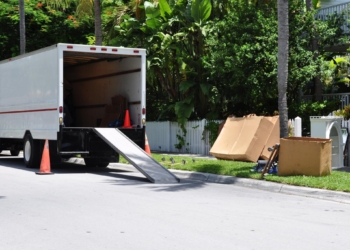Tax time is coming! If you had a Permanent Change of Station (PCS) move in 2020, you may be wondering if you can deduct any of your moving expenses on your federal income tax return.
The good news is that even though moving expenses are no longer deductible for most people, they are still deductible for active-duty military service members moving on PCS orders. The bad news is that you can’t deduct anything for which you received an allowance or reimbursement. While the military’s moving allowances cover most of the costs of moving, you may have unreimbursed expenses, especially if you are moving yourself.
Disclaimer: As with all things tax-related, an article can’t address your unique situation. Read the rules yourself, and talk to your tax preparer about your specific expenses and whether they can be deducted.
What moves are covered?
All military PCS moves are covered, including moving to the first permanent duty station, and the final separation or retirement move. Members of a household do not need to move together, but you can’t claim expenses for the same person more than once.
Moves of dependent spouse or children independent from the service member may be included in certain circumstances.
How do I claim my costs?
Moving expenses are calculated on IRS Form 3903. The form itself is pretty simple, and there is an online interactive tool to determine what expenses may be deducted. Be sure to check the box to indicate that you qualify to deduct your moving expenses on the basis of a PCS move.
The form has only five lines:
- Line one is for the expenses of transporting your household goods.
- Line two is for the cost of moving yourself and your family members.
- Line three adds lines one and two.
- Line four is where you list all reimbursements by the government.
- Line five subtracts your reimbursements from your costs.
Once you complete the form, you move the amount on line five to Schedule 1 of your 1040 Income Tax Return, on line 26. This is an adjustment to income that doesn’t require you to itemize your deductions. In addition to reducing your taxable income, it will decrease your Adjusted Gross Income, which can help you earn certain income-related tax credits.
What expenses may be claimed?
Expenses may be claimed if they are unreimbursed. Expenses you can claim may include but are not limited to:
- Packing, crating, and transporting your household goods.
- Connecting or disconnecting utilities.
- Shipping your car and your household pets.
- Moving your household goods and personal effects from a place other than your former home, up to the cost it would have been to ship those same items from your former home.
- Certain specific storage expenses.
- Lodging expenses while traveling to your new home.
- One night lodging in your old location.
- The first night’s lodging in your new location.
- Car transportation expenses, using either actual expenses or the standard deduction.
- Other transportation expenses.
You can not deduct the following move-related expenses:
- Meals while traveling from your old location to your new location.
- The cost of lodging except for one night at your old location, while traveling, and your first night in your new location.
- Vehicle registration fees or license plate costs.
- Driver’s license fees.
- Any part of the purchase price of a home.
- Costs of buying or selling a home (including closing costs, mortgage fees, and points).
- Costs of entering into or breaking a lease.
- Home improvements to help sell your home.
- Loss on the sale of your home.
- Losses from disposing of memberships in clubs.
- Mortgage penalties.
- Real estate taxes.
- Refitting of carpet and draperies.
- Return trips to your former residence.
- Security deposits (including any given up due to the move).
- Storage charges except those incurred in transit and for foreign moves.
The ability to deduct your moving expenses is special for the military, and it can make a big difference on your overall tax liability. Understanding the rules can help you get the biggest legal tax benefit.
Read comments
















































